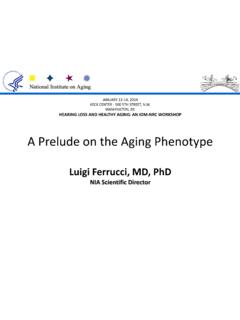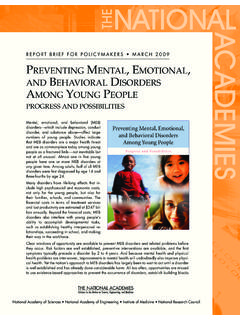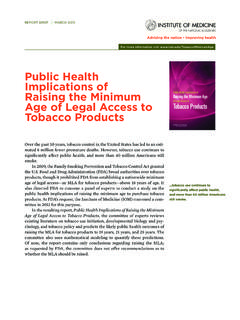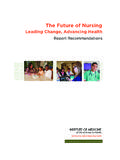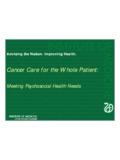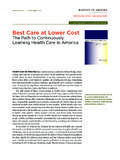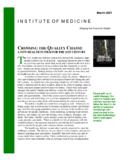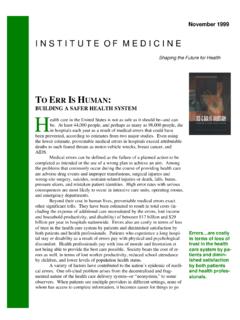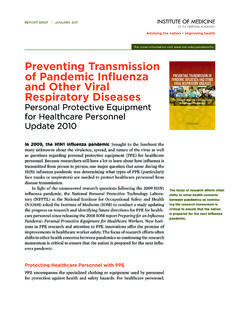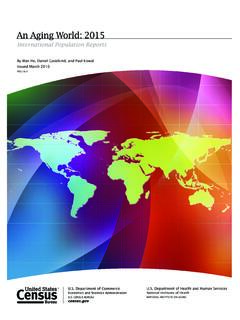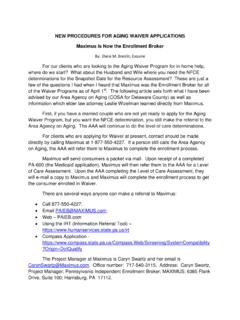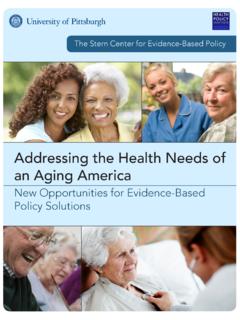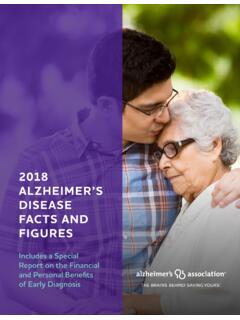Transcription of The Future of Nursing - National-Academies.org
1 REPORT BRIEF OCTOBER 2010. Advising the nation / Improving health For more information visit The Future of Nursing Focus on Scope of Practice Transforming the health care system to meet the demand for safe, qual- ity, and affordable care will require a fundamental rethinking of the roles of many health care professionals, including nurses. The 2010 Affordable Care Act represents the broadest health care overhaul since the 1965 creation of the Medicare and Medicaid programs, but nurses are unable to fully participate in the resulting evolution of the health care system. This is true for nurses at all levels, whether they practice in schools or community and public health centers or actue care settings.
2 A variety of historical, cultural, regulatory, and policy barriers limit nurses' ability to contribute to widespread and meaning- While challenges face nurses at all ful change. levels, the committee took par- In 2008, the Robert Wood Johnson Foundation (RWJF) and the Institute ticular note of the legal barriers in of Medicine (IOM) launched a two-year initiative to respond to the need to many states that prohibit advance assess and transform the Nursing profession. The IOM appointed the Com- practice registered nurses (APRNs). from practicing to their full educa- mittee on the RWJF Initiative on the Future of Nursing , at the IOM, with tion and training.
3 The purpose of producing a report that would make recommendations for an action-oriented blueprint for the Future of Nursing . As part of its report, The Future of Nursing : Leading Change, Advancing Health, the committee considered the obstacles all nurses encounter as they take on new roles in the transformation of health care in the United States. While challenges face nurses at all levels, the committee took particular note of the legal barriers in many states that prohibit advance practice registered nurses (APRNs) from practicing to their full education and training. The com- mittee determined that such constraints will have to be lifted in order for nurses to assume the responsibilities they can and should be taking during this time of great need.
4 The Changing Health Care System Inconsistent State Regulations In the 21st century, the health challenges facing State regulations often restrict the ability of the nation have shifted dramatically. The health nurses to provide care legally. State legislation care system is in the midst of great change as care regarding the legal scopes of practice for nurses . providers discover new ways to provide patient- which defines the activities that a qualified nurse centered care; to deliver more primary care as may perform vary widely. Some state legislation opposed to specialty care; and to deliver more care is very detailed, while in other states, there are in the community rather than the acute care set- vague provisions that are open to interpretation.
5 Ting. Nurses are well poised to meet these needs Some states have kept pace with the evolution of by virtue of their numbers, scientific knowledge, the health care system by changing their scope-of- and adaptive capacity, and health care organiza- practice regulations to allow nurse practitioners tions would benefit from taking advantage of the (NP) and certified nurse midwives, for example, contributions nurses can make. to see patients and prescribe medications without As the health care system has expanded over a physician's supervision or collaboration. Most the past 40 years, the education and roles of states, however, have not made these changes.
6 As APRNs, in particular, have evolved in such a way a result, what NPs and, more broadly, APRNs are that nurses now enter the workplace qualified to able to do after graduation varies widely across provide more services than had been the case pre- the country for reasons that are not related to viously. Yet while APRNs are educated and trained their ability, education, or training, but rather to to do more, some physicians challenge expand- the political decisions of the state in which they ing scopes of practice for nurses. The committee work. stresses that physicians are highly trained and Both educational and national certification skilled providers and that some services clearly standards which most, if not all, states recog- should be provided by physicians, who have nize support broader practice by APRNs.
7 No received more extensive and specialized educa- studies suggest that APRNs are less able than tion and training than APRNs. However, given the physicians to deliver care that is safe, effective, great need for more affordable health care, nurses and efficient or that care is better in states with should be playing a larger role in the health care more restrictive scope of practice regulations for system, both in delivering care and in decision APRNs. In fact, evidence shows that nurses pro- making about care. vide quality care to patients, including preventing The committee argues that APRNs are not medication errors, reducing or eliminating infec- acting as physician extenders or substitutes.
8 Tions, and easing the transition patients make They work throughout the entirety of health care, from hospital to home. Yet most states continue to from health promotion and disease prevention restrict the practice of APRNs. However, various to early diagnosis to prevent or limit disability. stakeholders are working to develop ways to elim- APRNs sometimes provide services that many inate variations in scope of practice regulations people associate with physicians, such as assess- across states. In 2008, several Nursing organiza- ing patient conditions or ordering and evaluating tions came together and developed a consensus tests, but they also incorporate a range of services model for standardizing the regulation of APRNs, from other disciplines, including social work, including education, accreditation, certification, nutrition, and physical therapy.
9 And licensure. This model will help encourage the development of consistent regulations that recog- nize the competence of APRNs across states. 2. The trend over the past 20 years has been a growing receptivity on the part of state legislatures to expanded scopes of practice for nurses. Quite simply, there are not enough primary care physicians to care for today's aging population, and the patient load will dramati- cally increase as more individuals gain insurance coverage. Current laws in many states are hampering The Federal Government's Role in the ability of APRNs to contribute to innovative Reform health care delivery solutions. Some NPs, for The federal government has a compelling interest example, have left primary care to work as special- in the regulatory environment for health care pro- ists in hospital settings.
10 Others have left NP prac- fessions because of its responsibility to patients tice altogether to work as staff RNs. State regula- covered by federal programs including Medicare, tions have limited the expansion of retail clinics, Medicaid, the Veterans Administration, and the where NPs provide a limited set of primary care Bureau of Indian Affairs. Equally important is the services directly to patients. Depending on the responsibility to all American taxpayers who fund state, restrictions on an APRN's scope of practice the care provided under these programs to ensure may limit or prohibit the authority to prescribe that their tax dollars are spent efficiently.
